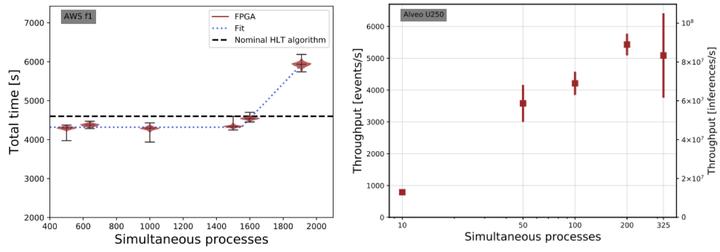FPGAs-as-a-Service Toolkit (FaaST)
 Total processing time required with AWS f1 (left) and throughput achieved with a Alveo U250 (right) for running a realistic HLT workflow using the FACILE FaaST server as a function of the number of simultaneous clients.
Total processing time required with AWS f1 (left) and throughput achieved with a Alveo U250 (right) for running a realistic HLT workflow using the FACILE FaaST server as a function of the number of simultaneous clients.
Abstract
Computing needs for high energy physics are already intensive and are expected to increase drastically in the coming years. In this context, heterogeneous computing, specifically as-a-service computing, has the potential for significant gains over traditional computing models. Although previous studies and packages in the field of heterogeneous computing have focused on GPUs as accelerators, FPGAs are an extremely promising option as well. A series of workflows are developed to establish the performance capabilities of FPGAs as a service. Multiple different devices and a range of algorithms for use in high energy physics are studied. For a small, dense network, the throughput can be improved by an order of magnitude with respect to GPUs as a service. For large convolutional networks, the throughput is found to be comparable to GPUs as a service. This work represents the first open-source FPGAs-as-a-service toolkit.
Supplementary notes can be added here, including code and math.